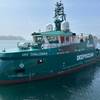OCS Safety Board Report Next Steps on Reforms
Secretary of the Interior Ken Salazar announced that a team led by senior officials in the Department of the Interior, including Interior’s Inspector General, have completed a review of offshore oil and gas oversight and regulation and have delivered a set of recommendations that reinforce and expand on ongoing reforms being carried out by Bureau of Ocean Energy Management, Regulation, and Enforcement (BOEMRE) Director Michael R. Bromwich.
The report of the Outer Continental Shelf (OCS) Safety Oversight Board, which Secretary Salazar established immediately following the explosion of the Deepwater Horizon rig, provides recommendations to strengthen permitting, inspections, enforcement and environmental stewardship. Director Bromwich announced today that BOEMRE has developed an implementation plan for the recommendations, many of which are already underway or planned.
“I tasked the OCS Safety Board with taking a hard, thorough look – top to bottom - at how this department regulates and oversees offshore oil and gas operations and provide me their honest and unvarnished recommendations for reform,” said Secretary Salazar. “The report is what I was looking for: it is honest; it doesn’t sugarcoat challenges we know are there; it provides a blueprint for solving them; and it shows that we are on precisely the right track with our reform agenda. We are absolutely committed to building a regulatory agency that has the authorities, resources, and support to provide strong and effective regulation and oversight – and we are on our way to accomplishing that goal.”
“The goal of our efforts is a culture of safety, in which protecting human life and preventing environmental disasters are the highest priorities, while making leasing and production safer and more sustainable,” said Assistant Secretary Wilma Lewis, who chaired the Safety Oversight Board. Mary L. Kendall, Acting Inspector General of Interior and Rhea S. Suh, Assistant Secretary for Policy, Management and Budget, also served as members of the Board.
“My mandate from the President and Secretary was explicit– reform the way the agency does business in managing and regulating offshore energy development on the nation’s Outer Continental Shelf,” said BOEMRE Director Bromwich, who noted that the initiatives are consistent with the reform agenda he has been developing and implementing. “Many of the Board’s recommendations will be addressed through initiatives and programs that are already in process and are central to our reform agenda.”
The Safety Oversight Board’s findings and recommendations provide a framework to build upon reforms to create more accountability, efficiency and effectiveness in the Interior agencies that carry out the Department’s offshore energy management responsibilities. The recommendations address both short- and long-term efforts that complement other ongoing reports and reviews, such as the Secretary’s May 27 report to the President, the Presidential inquiry into the Deepwater Horizon oil spill and the U.S. Coast Guard-Interior investigation into the causes of the incident.
The recommendations range from improved consistency and communication of BOEMRE’s operational policies to technology improvements and day-to-day management in the field. Strengthening inspections and enforcement – from personnel training to the deterrent effect of fines and civil penalties – is a major focus of the recommendations.
BOEMRE’s implementation plan outlines the initiatives and programs that the Bureau is undertaking which address the report’s recommendations, including: reorganizing MMS to address real and perceived conflicts between resource management, safety and environmental oversight and enforcement, and revenue collection responsibilities; seeking additional resources in the form of funding, personnel, equipment and information systems; ethics reforms that include the establishment of an Investigations and Review Unit and a new recusal policy to address potential conflicts of interests within BOEMRE and industry; and Inter-Agency coordination with federal agencies related to oil spill response and the mitigation of environmental effects of offshore energy development.










